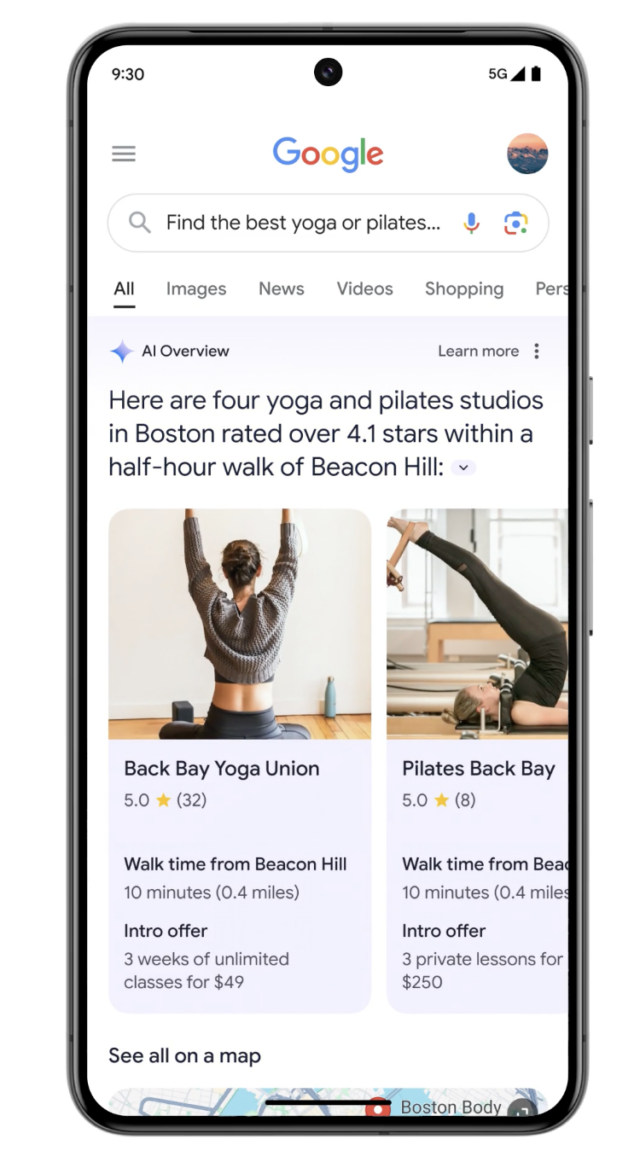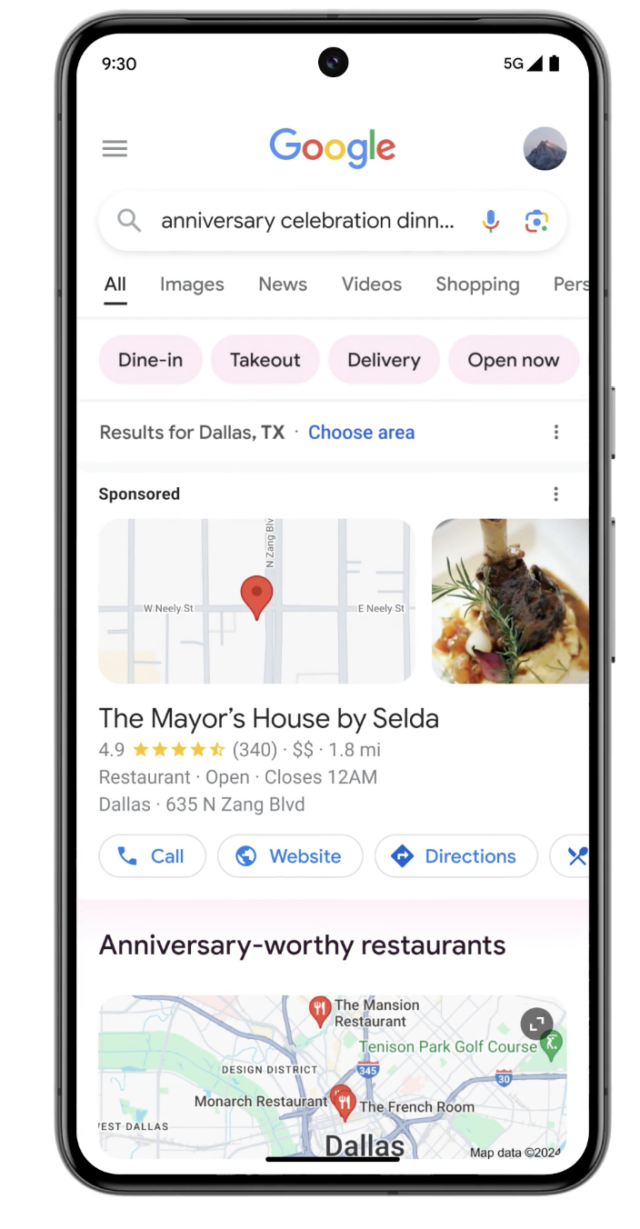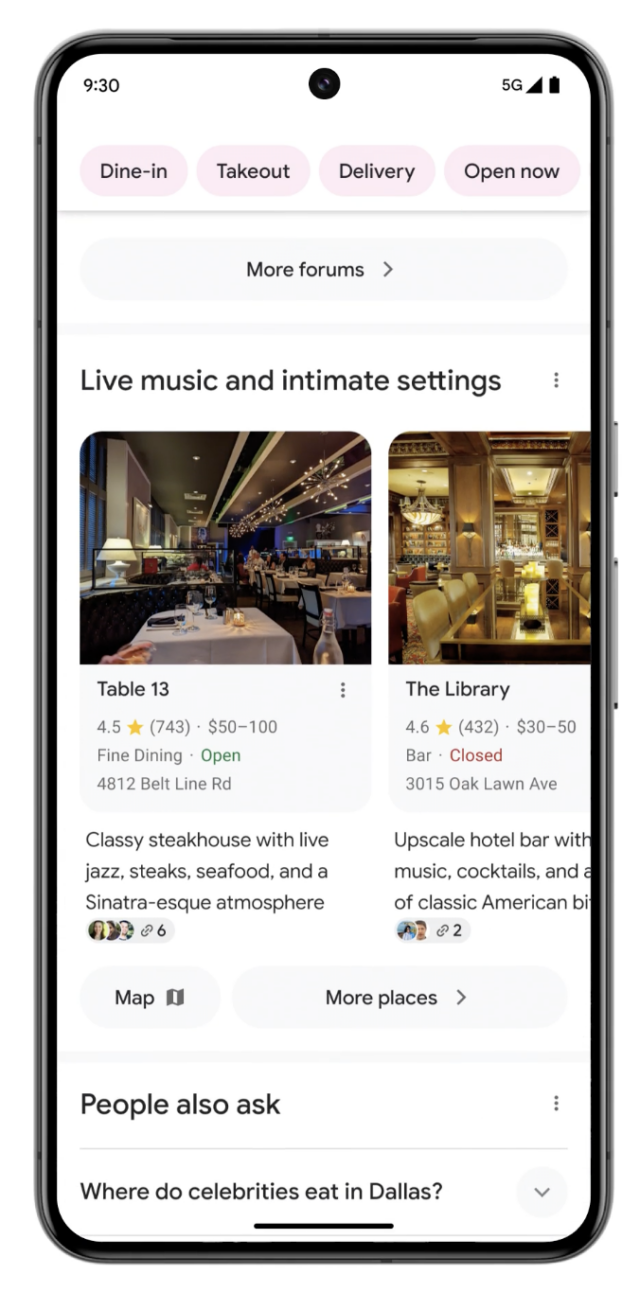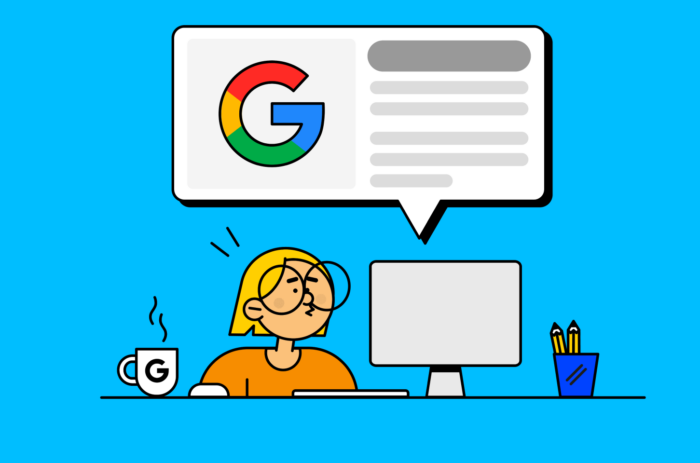Google’s annual developer conference has consistently rocked the digital world since its 2008 debut in Mountain View, California.
Known as Google I/O, the keynote is Google’s opportunity to announce the latest advancements in its technology and offer a glimpse at what’s to come. Past Google I/Os have seen the public introduction of such Google products as the Google Assistant, Google Lens, and more.
And, like always, 2024’s summit is the subject of the week in the search industry. Following its May 14th premiere, search professionals are scrambling to figure out what Google’s self-coined “Gemini era” means for the industry.
What is Google Gemini?
Gemini is Google’s Artificial Intelligence interface. Previously known as Google Bard, Gemini offers regular users access to Large Language Models (LLMs) to help them use Google in new and exciting ways. With Google Gemini, users are encouraged to test the boundaries of what’s possible within Google products. In its current incarnation, Gemini can help users with general queries, reasoning, math, code, and image, video, and audio creation.
As noted by Google’s Liz Reid,
“With each of these platform shifts, we haven’t just adapted, we’ve expanded what’s possible with Google Search. And now, with generative AI, search will do more for you than you ever imagined. So whatever’s on your mind, and whatever you need to get done, just ask, and Google will do the Googling for you.”
There is a lot of fancy talk surrounding what seems to be an even fancier product. But what does that really mean for local SEOs, who already spend their days deciphering Google’s ever-changing algorithm?
In the words of Near Media’s Greg Sterling: Gemini was the star. Search was there… but in more of a supporting role. Nonetheless, search still got its screentime, with four important updates for local SEOs to focus on—AI Overviews, multi-step reasoning, topic clusters, and itinerary planning with Gemini Advanced.
Let’s take a look at the big announcements most relevant to local SEOs…
AI Overviews
This looks more interesting beyond the standard SGE integration we know. Example of an "AI-organized search results page", bringing it together in a dynamic/full-page experience. Apparently this will be launching within the US in the coming weeks (in labs first). #GoogleIO pic.twitter.com/QaIvFagETT
— Brodie Clark (@brodieseo) May 14, 2024
What is it?
AI Overviews is the official name of what was previously called Google’s ‘Search Generative Experience‘. It uses the information collected via Gemini’s multi-step reasoning (more on this below) to present a clear, organized search result that answers all of the user’s questions… and then some.
AI Overviews are, essentially, a quick overview of the answer to the query with links to learn more.
Gemini becomes the user’s “personal agent”, offering the user all of the pertinent information regarding their query. This allows for complex questions to be answered simply and clearly, all within a single search result page.

This new feature is due to be rolled out to US users this week, with more countries coming soon.
These search results pages consider information that a typical searcher may not have even considered. Take a query about “anniversary celebration dinner spots in dallas.” Gemini’s approach to search intuits the need to check the weather before offering locations.
Breezy summer evening? Gemini knows that a rooftop bar might do the trick. So, once again, it all comes down to detail—businesses must offer Gemini as much specific information about themselves as possible so that they’re first on Gemini’s list when a relative search is made.
Note: AI Overviews won’t be shown for all queries, only those that Google deems complex enough to warrant an AI-generated response.

What does it mean for local SEO?
In our article on SGE in June 2023, we explored what an AI-generated search response would mean for local search. Since then, some elements of this new search function have changed, but most remain the same.
The key thing that all content publishers should be wary of is whether Google will be showing links, citations, and sources in its AI Overviews. For now, it seems like there’s no consistent answer to that. Some searches return what you might call a ‘zero-click’ result (where the response provides the answer and nothing more), while more complex or debatable answers are prefixed with ‘According to’ and link to the source of the response, presumably so that Google can put the onus on its sources for contentious or controversial topics.
What about searches for local businesses? Well, examples of this were given quite an airing in the keynote, and it seems like, for now, any business information returned for local search terms comes from the usual places: Google Business Profile, directories, citation sites, review sites, and news articles and blog posts recommending businesses.
Keeping your business profiles across Google and other listings platforms remains as crucial as ever, and some form of the ‘local pack’ will likely remain, as Google has a vested interest in adding value to its Google Business Profile product.
The bigger question will be around whether local businesses will continue to see value in publishing localised or locally-relevant content to attract customers via what was the organic ‘ten blue links’.
In a world where Google can take the contents of your article on “the best events for visitors to [your town]” and hand it to searchers without ever linking to your business, you might be thinking again about investing in an organic search strategy.
Ultimately, AI Overviews is the biggest shift in Google search that we’ve seen in decades, and we’ll be closely monitoring how it works in order to provide our readers with the best advice on improving and understanding visibility in the Gemini era.
BrightLocal’s Take on AI Overviews
Multi-step Reasoning
What is it?
Throughout the summit, Google emphasized multi-step reasoning as a key feature of the Gemini era. So, what does that mean?
According to Google, ‘multi-step reasoning’ refers to the tool’s ability to take a larger, multi-part question and break it down into sections before determining what needs to be answered and in what order. It then uses reason, alongside Google’s vast information index, to answer the questions logically.
Coming soon, we’ll bring new multi-step reasoning capabilities to Google Search. It breaks your bigger question down into parts and figures out which problems to solve and in what order, so research that might've taken you minutes or even hours can be done in seconds. #GoogleIO pic.twitter.com/Op8Iu7K21m
— Google (@Google) May 14, 2024
What does it mean for local SEO?
Considering that Gemini needs to get its information somewhere, it’s more important than ever that businesses provide Google with the most detailed and accurate information possible for Google to find.
Ratings, reviews, business hours, and more can all come into play when someone queries Google, and the last thing a business needs is for Google to spit out the wrong information or, even worse, overlook it entirely.
Topic Clusters
What are they?
Remember the query about anniversary spots? Just because outdoor seating could be a good option due to the sunshine doesn’t mean it’s the only option.
Instead, the personalized search results page will be broken down into what Google refers to as “topic clusters.” These clusters group results based on unique angles of the search, such as “outdoor seating,” “rustic charm,” or “restaurants with live music,” offering users different directions to take their query.

What do they mean for local SEO?
Details. Details. Details. We can’t say it enough. For Google to determine that a restaurant belongs in that “rustic charm” cluster, it’ll need evidence to prove it. Having a fully filled-out Google Business Profile, a robust history of reviews, and a detailed website all help signify to Google that yes—this is one of the top “rustic charm” restaurants in town.
Gemini Advanced
What is it?
Gemini Advanced takes all the above functionalities and offers a full-fledged itinerary-planning capability. Whether you’re trying to figure out a family-friendly meal plan or planning a romantic trip to New York City, Gemini Advanced uses its multi-step reasoning capacities and topic clustering features to provide a fully personalized AI overview of the ideal plan.
What does it mean for local SEO?
With Gemini Advanced, Google will look at more than just your business—it’ll look at the context surrounding it.
With the advanced contextualization and reasoning around search results, Gemini Advanced will know not to show the local ice cream parlor in the dead of winter following a Christmas Market. However, it may know to show it if it serves the best hot cocoa in town and is only a block away from the market’s entrance.
But, to make those connections, it needs the correct data to draw upon… such as an updated menu, mentions in local publications, and a host of positive reviews.
Google on Responsibility
Acknowledging the uncertainty that always comes alongside new technologies, Google assures that they’re approaching Gemini with the same AI principles they say they’ve always abided by.
Google’s AI Principles
- Be socially beneficial
- Avoid creating or reinforcing unfair bias
- Be built and tested for safety
- Be accountable to people
- Incorporate privacy design principles
- Uphold high standards of scientific excellence
- Be made available for uses that accord with these principles
Also, according to Google, they are introducing Gemini with the intention of maximizing the benefits for people and society. And, while local SEO may change according to these new tools, we trust Google’s intention to use its AI for a better user experience.
In Summary
Overall, the significance of these updates to local all comes down to the same thing: data accuracy and detail are more important than ever. With an expert tool crawling the web to find the best possible fit for a user’s query, businesses need to ensure that the tool can find them—and everything it needs to know about them. Things like having comprehensive and descriptive FAQs will become even more important players in visibility.
That being said, this is all based on what we know right now. The most important thing is that businesses continue to stay agile and up-to-date on industry trends; with Google’s constantly changing methods, it’s important never to get too stuck in your ways. This year’s Google I/O is simply further proof of that.


